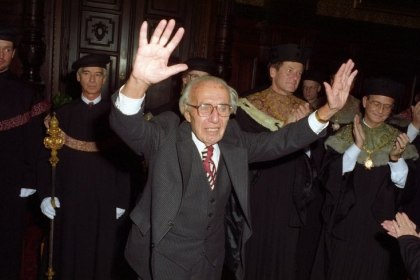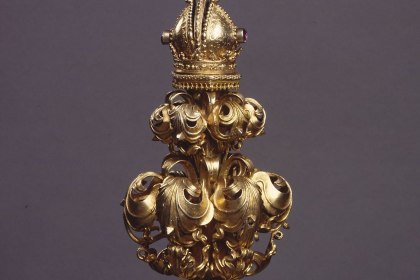Critical review of the University of Vienna's honors practice in 2022/23
In 2022/23, on the initiative of Senate members Oliver Rathkolb and Ilse Reiter-Zatloukal, archivists and contemporary historians from the University Archives and the “Forum Zeitgeschichte der Universität Wien” were commissioned by the Senate and the Rectorate of the University of Vienna and with the involvement of all 20 faculties and centers to critically assess the approximately 1,600 honors awarded by the University of Vienna to date. If there were any aspects worthy of discussion or problematic, individual honorees were assigned to the appropriate category, citing these reasons, and corresponding biographical entries were written.
The deans and center directors reviewed, commented on and supplemented the biographies and lists together with the subject-specific historical experts. With only a few exceptions, the assessments and biographical entries were approved by the faculties and centers for the final report to the Rectorate and Senate by consensus.
General framework
The honoring of individuals by the University of Vienna implies the desire for public recognition of a person and the establishment of a relationship between the honoree and the university. When living persons are honored, they become part of the university's culture of remembrance for their lifetime: honors adhere to the honored persons as highly personal rights and end with their death. The erection of memorials as a permanent honor after death can only take place at the earliest 15 years after the death (exception: memorial “Nobel Prize and University”). Since 2007, designations of premises (lecture halls, parts of buildings, courtyards, institutes, etc.) can be made in memory of both the living and the deceased without the 15-year intercalary period and do not end with the death of the honored person. In 2004, the University's statutes also adopted the old regulation of revoking honors and awards „if the honoree proves to be unworthy of the honor through his or her behavior“ (§ 17).
Just as the act of honoring is situated in a specific historical context, the consideration of later generations is also subject to a constantly changing social, political and historical perspective. At the end of 2021, the University of Vienna decided to critically examine its honors since 1865 (500th anniversary), as other Austrian universities have already done in recent years or are doing at the same time (e.g. University of Salzburg 2014/15, University of Innsbruck 2019, Vienna University of Economics and Business 2023), including the honors of the Faculty of Medicine until 2004 within the framework of the University of Vienna (today: Medical University of Vienna). With the inclusion of newly accessible archival documents and research results, a basis for a more differentiated positioning of today's university with regard to its previous honors was developed.
The University of Vienna decided in advance on the principles of “transparency - commentary - visualization” instead of “symbolic posthumous de-recognition”.
A visualization of the honorees with their merits and any problems as well as the position of today's university took place after the presentation of the final report „Problematic and debatable honors of the University of Vienna“ on April 27, 2023 and the adoption of the report in the Senate on June 22, 2023 on this website, the official history of the University of Vienna. On October 24, 2023, the results were presented to a wider public at a press conference.
Overall scope
Of the 1,577 personal honors awarded in the 19th/20th/21st century to date, 28 individuals (33 honors) are considered problematic from today's perspective and 39 individuals (56 honors) are considered worthy of discussion.
During this period, the most frequent individual forms of honor were honorary doctorates (374 awards) and decorations/"Ehrenzeichen" (216 awards), followed by the erection of individual monuments in the arcade courtyard (160). Forms of honors grouped together, such as the faculty honorary plaques (188 honors between 1893 and 1981/82), have been supplemented in the last two decades with the processing and honoring of university members expelled during Austrofascism and/or National Socialism (memorial to expelled art historians in 2008 with 72 names, memorial to expelled history students and teachers in 2022 with 120 names). For the frequency of the various forms of tribute and their distribution by faculty/center, see chart 1 opposite.
Problematic honors
The following definition of “problematic honors” was used in the critical review of the University of Vienna's honors practice to date in 2022/23:
“Problematic honors are those awarded to individuals who have made anti-Semitic, racist or fascist statements or actions in public or who have expressed prejudices towards group-based misanthropy.”
From today's perspective, 28 people, who received a total of 33 honors, were classified as “problematic” (the number of honorees differs from the number of honors due to three double honors and one triple honor).
These are spread across nine faculties of the University of Vienna, with five honorees or seven honors being awarded to the then Faculty of Medicine/now: Medical University of Vienna (see chart 2)
Honors worthy of discussion
The critical critical review of the University of Vienna's honors practice to date in 2022/23 was based on the following definition of “honors worthy of discussion (diskussionswürdig)”:
"Honors of persons who have rather formally supported ideologies or functionaries* who have emerged through anti-Semitic, racist, fascist content or have propagated prejudices towards group-related misanthropy (such as simple NSDAP members without further functions and public commitment) are considered worthy of discussion"
From today's perspective, 39 people who received a total of 56 honors were classified as “worthy of discussion” (the number of honorees differs from the number of honors due to seven double honors, two triple honors and two quadruple honors).
These are distributed across eleven faculties and centers of the University of Vienna, with ten honorees or 15 honors being awarded by the former Faculty of Medicine/current Medical University of Vienna (see chart 3).
Outlook
Recent and legally unresolved disputed cases of “worthiness/Würdigkeit” of an honor or an honoree due to allegations of corruption or violations of the rules of good scientific practice could not be reliably and conclusively assessed using the methods and source basis of contemporary historical research (data protection, open accusation or court proceedings, presumption of innocence) and are reserved for later treatment.
In one faculty, the honors could not be conclusively processed during the project period, so the possibility cannot be ruled out that the number of cases “worthy of dicussion” and “problematic” could increase throughout the university.
At the Medical University of Vienna, too, the honors and honorees processed in close coordination and cooperation are subject to further critical reflection and names in the two categories could still be added in individual cases. In general, for a university of this size, a review process can necessarily only be a “work in progress”, which will also lead to new findings and conclusions in the future, whether retrospectively with regard to past honors practice or prospectively with regard to findings for current and future honors practice.
- List of honors wothy of discussion and and problematic honors alphabetically
- List of honors wothy of discussion and and problematic honors by faculty
In 2024, the Senate of the University of Vienna decided, no further monuments are allowed to be built in the arcaded coutyard/Arkadenhof of the main building of the University of Vienna.
-
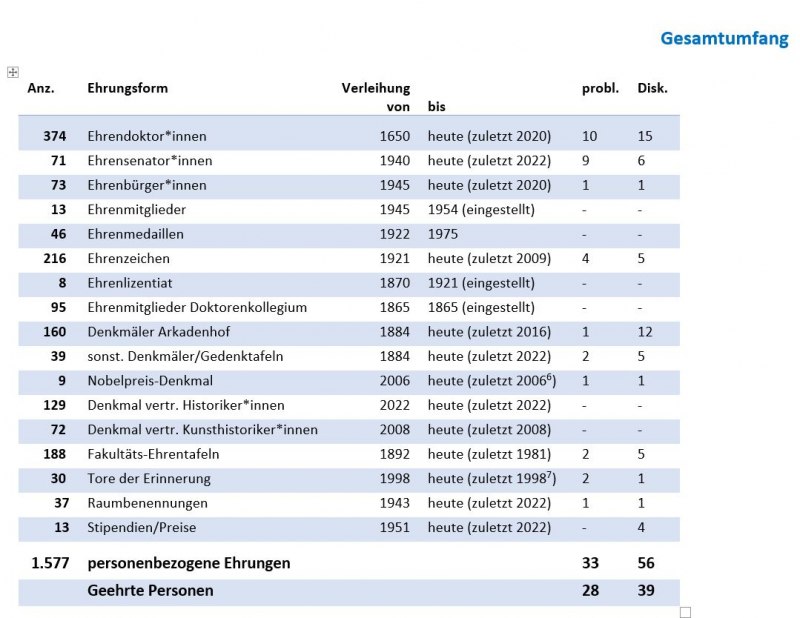
Kritische Reflexion Ehrungen 2023 gesamt
Übersicht über die bei der kritischen Reflexion der bisherigen Ehrungspraxis 2022/23 erhobenen Ehrungen generell nach Ehrungsform, Ehrungszeitraum,...
-
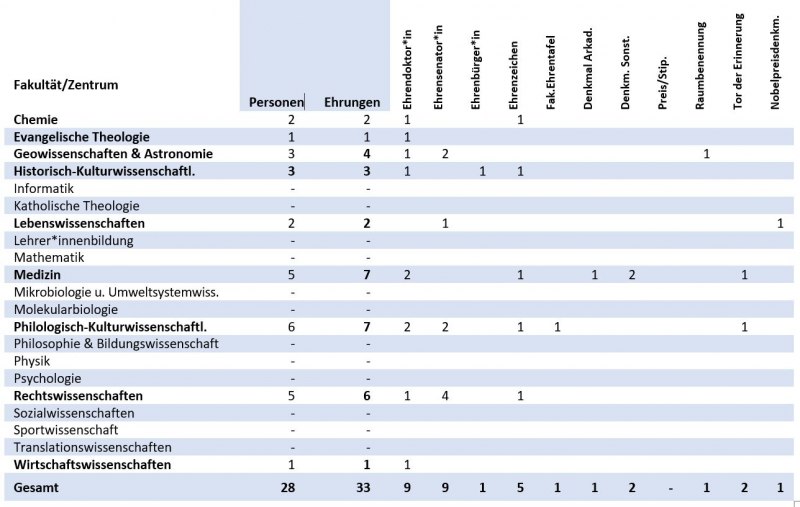
Kritische Reflexion der bisherigen Ehrungen 2023: „Problematische“ Ehrungen
Übersicht über die bei der kritischen Reflexion der bisherigen Ehrungspraxis 2022/23 erhobenen "problematischen" Ehrungen bzw. Geehrten bzw...
-
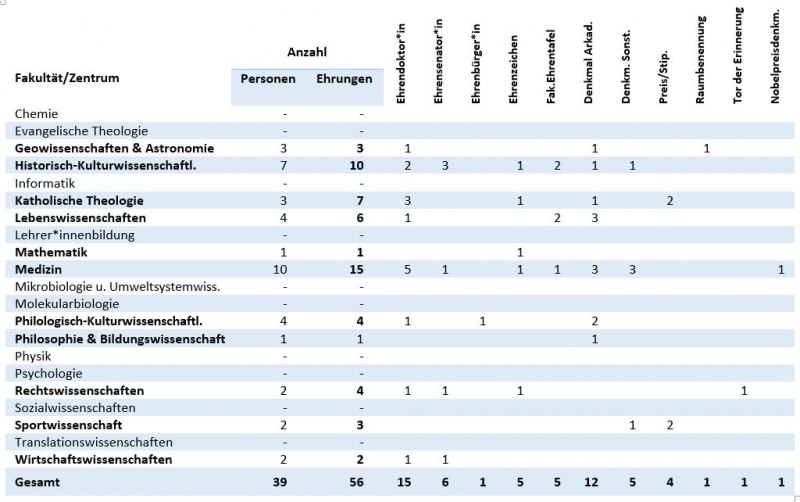
Kritische Reflexion der bisherigen Ehrungen 2023: „Diskussionswürdige“ Ehrungen
Übersicht über die bei der kritischen Reflexion der bisherigen Ehrungspraxis 2022/23 erhobenen "diskussionswürdigen" Ehrungen bzw. Geehrten bzw...
Zuletzt aktualisiert am 10/22/24
-
Honors of the University of Vienna
1858–21th Cent. -
Ehrensenator*innen der Universität Wien
1941–21th Cent.



